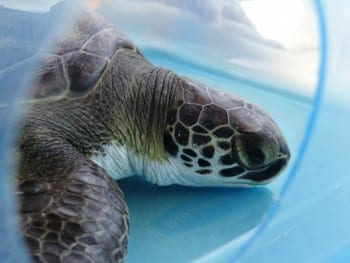UCF’s Mansfield Keynote Speaker at International Sea Turtle Symposium
 Biology assistant professor Kate Mansfield, Ph.D., and five of her graduate students headed to Turkey last week to present at the 35th annual Symposium on Sea Turtle Biology and Conservation.
Biology assistant professor Kate Mansfield, Ph.D., and five of her graduate students headed to Turkey last week to present at the 35th annual Symposium on Sea Turtle Biology and Conservation.
Mansfield, who earlier this month gained international attention for a study about young turtles swimming with a purpose, is one of the four keynote speakers. Her topic is “Out with the old, in with the new hypotheses: swimming behavior and genetic habitat shifts among wild-caught oceanic state turtles.” She is considered an innovator for her work in the field.
Mansfield said she was honored to be asked to speak and hopes her students will benefit from their own presentations.
“I’m looking forward to it,” she said. “It is a good to share and discuss with others conducting research in the field and it is a wonderful opportunity for students to present their work and network.”
Mansfield heads the UCF Marine Turtle Research Group, which conducts work in Brevard County as well as the Gulf of Mexico and waters off South America’s coastline.
Among the five students traveling to Mugla, Turkey, for the conference was Katrina Phillips, who earlier this month earned a National Science Foundation Graduate Research Fellowship to continue her research into endangered sea turtles.
The conference is one of the biggest sea turtle science and conservation meetings in the world and draws hundreds of experts in the field. This year, there will be 135 presentations and workshops and 225 posters shared with attendees. Topics cover everything from education and policy to genetics and economic and cultural studies as they relate to sea turtles.
Mansfield’s talk included new information she and biologist Nathan Putman covered in an article published earlier this month, as well as other research she conducts on ocean-going juvenile turtles. Putman, the lead author, works for NOAA’s Southeast Fisheries Science Center in Miami.
They discovered that even at a tender 6 to18 months, turtles are very active swimmers. They don’t just passively drift in ocean currents as researchers once thought.
To read more about the study click here. In March 2014, Mansfield published first-of-its-kind data from young sea turtles swimming off Florida’s coast, thanks to a satellite tracking system. To read more about that groundbreaking study click here.
